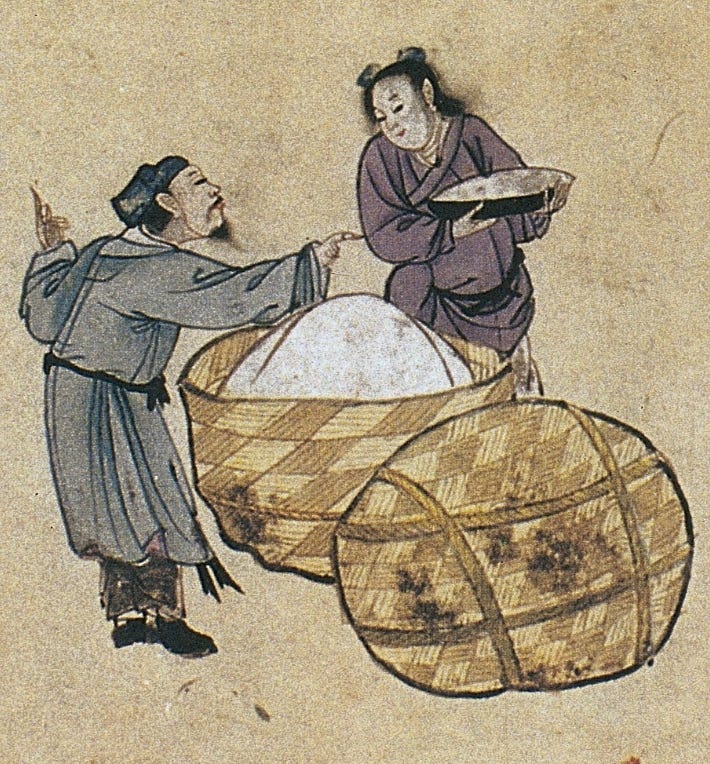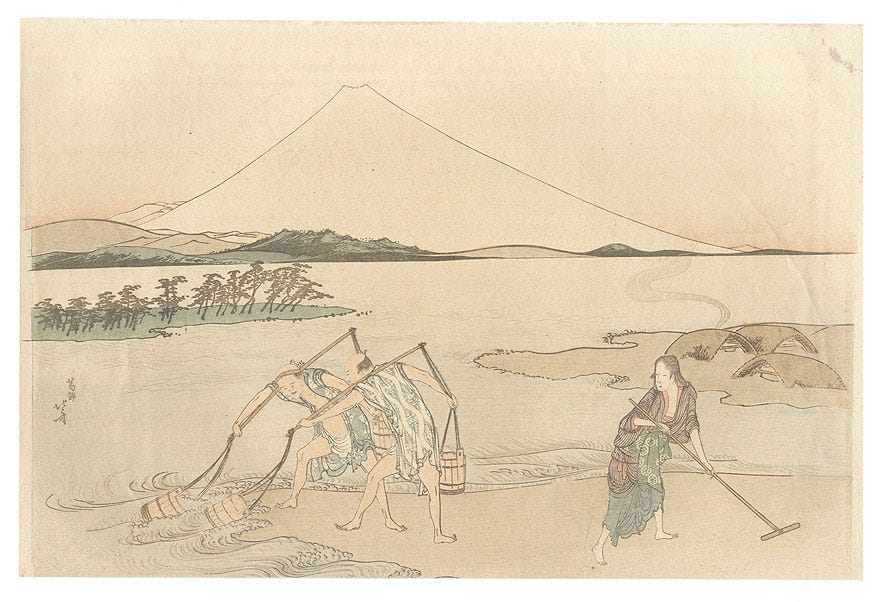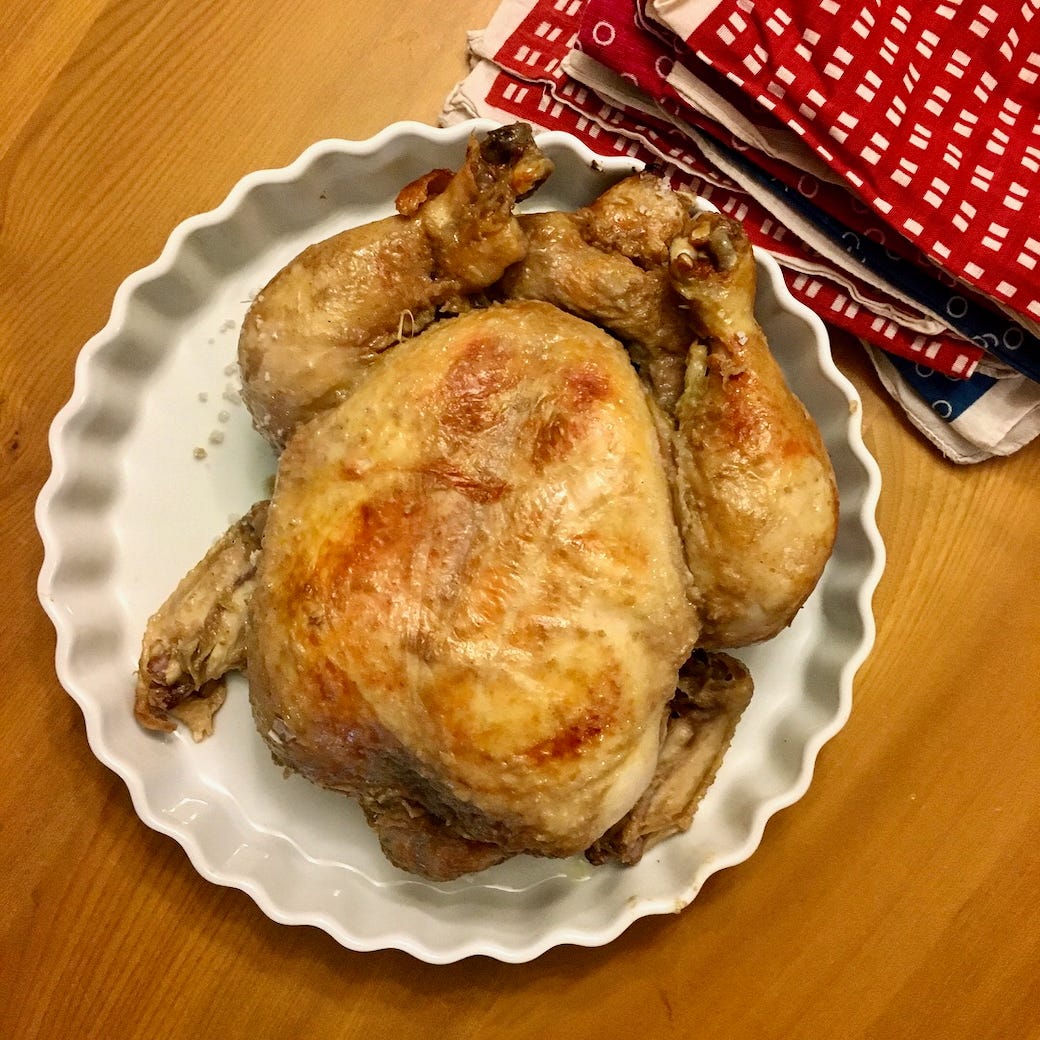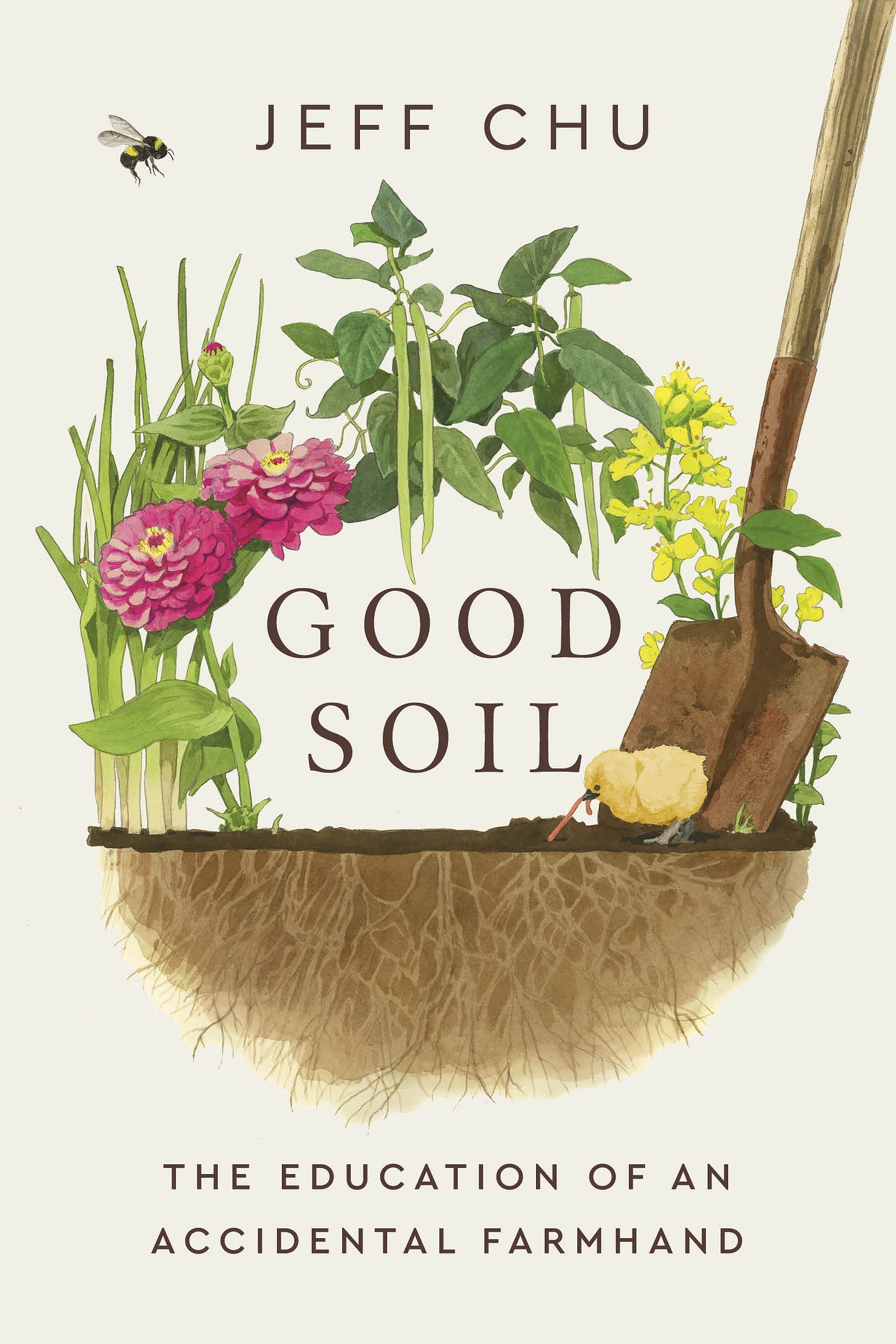Lent III: Salty
Some fragmented thoughts about a powerful substance, Jesus's vexing instruction, cooking with my mom, and medieval notions about salt's sacred importance
March 21, 2025
Berkeley, Calif.
If there’s one thing that my mom and I often disagree on in the kitchen, it is the level of salt. In the kitchen as in the rest of life, I suppose: She tends to be much more conservative than me.
It’s not that I prefer things to be salty; I just like them well seasoned. “The primary role that salt plays in cooking is to amplify flavor,” Samin Nosrat writes in her magisterial book Salt, Fat, Acid, Heat. “Does this mean you should simply use more salt? No. It means use salt better. Add in the right amount, at the right time, in the right form.”

Used properly and with care, salt balances bitterness and enhances sweetness. As with almost anything else, too much isn’t a good thing.
“You are the salt of the earth,” Jesus said. I wish he’d clarified exactly what he meant by that. It might have been helpful. Were we supposed to be a preservative? A flavor enhancer? Maybe there was, built into that instruction, a wry prophecy that people might need a break from the righteous Christian.
Many chefs have observed that, in the right amounts, salt simply makes food taste more like itself. I’d like to believe that when Jesus was telling his followers that they were the salt of the earth, he was calling on them to help the world be as beautifully itself as it could.
--
Every year or two, I’ve received a similar email from my mom: “Do you want me to come cook a meal?” she asks. “Let me know.”
To say no would feel dishonoring—and honestly, given how good her food is, a little stupid. We scheduled her latest visit for a few weeks after the chicken slaughter. Because this was her first trip to see us since I started seminary, theology was on my mind as we prepared. Her theology— on sexuality, on salvation, on heaven and hell—has not shifted, as far as I can tell.
Several years ago, during one of her visits, I noticed she had a copy of Left Behind, the apocalyptic Christian novel. This book is not on the recommended reading list in my household. Its prose traffics in fear; its theology fetishizes hellfire. In the spirit of honoring my mother, I censored the first dozen or so possible responses to the presence of this book in my house. Finally I asked her why she had it with her, since I knew she had read it years before, and it’s not exactly a story that merits multiple reads. She explained that she was going to see another relative after visiting us, and she wanted to let this family member know what might happen if she didn’t go back to church.
If the aspects of my mother’s convictions that I find troubling haven’t changed, those that give me hope haven’t either. I see evidence of her theology in how she lovingly monitors my health and my workload and my diet. I see it in her conviction, expressed through her constant prayers. I see it in the meals she cooks for international students and the scarves she knits for those living on the streets and in the parent-teacher conferences she attended on behalf of friends who spoke little English.
I see it through her faithful witness to the beauty of becoming, expressed through the cleaver’s precise chop, the wok’s transformative heat, and the rice cooker’s steam.
Over the years, friends have told me they think I have chosen poorly. In their view, my parents are oppressive, even abusive. I should stop seeing them until they affirm my sexuality and my marriage.
Those friends are still welcome at my table—just as my mother is. My mom’s example reminds me that I believe in a difficult love. This kind of love doesn’t shy away from discomfort, and it doesn’t mistake discomfort for danger. It subordinates our theological disagreements to the clear call to feed the hungry and clothe the needy. It shows up, as courageously as it can, even in the midst of confusion.
...
“I hope I get to taste the chicken you raised,” my mother wrote me not long before her arrival in Princeton. “Are you selling them? If so, you should buy them all, haha!”
--
“All your grain offerings you shall season with salt; you shall not omit from your grain offerings the salt of the covenant with your God; with all your offerings you shall offer salt.” —Leviticus 2:13
I didn’t notice until recently that Leviticus was, in addition to a compendium of abominations, also a cookbook. The medieval rabbis had some fun with this.
Apparently the division of the upper waters (the heavens) from the lower (the oceans) caused no small amount of separation anxiety, and the seas were irritated to be further from God. According to Rashi, they got a consolation prize: “The lower waters... received an assurance that they would be offered on the altar in the form of salt.”
Ibn Ezra wrote, by way of explanation, “God caused you to enter the covenant and made you swear that you would not offer anything which is unsalted and inedible, for that is an insult.” At my table as at God’s!

--
That Farminary chicken I’d saved to cook with my mom: We decided to prepare it in the style of my father’s people, the Hakka.
One of the central dishes in Hakka cuisine is salt-baked chicken. The whole bird is brushed with Shaoxing wine and dry-brined overnight, uncovered in the refrigerator, in salt, white pepper, and sand ginger powder. (Sand ginger, also known as lesser galangal or Kaempferia galanga, is more floral than the ginger root stocked in most grocery stores.)
The next day, you pull the chicken out of the fridge, let it come to room temperature, brush the skin with oil, and wrap it all tightly in parchment paper. You’ll need the same amount of coarse salt as you have chicken—in other words, three pounds of salt for a three-pound bird. Heat a dry wok or frying pan, then toss the salt in, stirring it regularly for about ten or fifteen minutes until it just begins to turn golden.
Then, spread a layer of that salt at the bottom of the wok (if it’s big enough and you have a cover), a Dutch oven, or, as is traditional, a Chinese clay pot. Pop the parchment-wrapped chicken in, cover it completely with the remaining salt, then roast it in a hot oven until it’s just cooked and still juicy. (Traditionally, few Chinese families had ovens, and this would have been done on hot coals.)
As we cooked, my mom told me that when she was a kid in Hong Kong, her uncle kept chickens. This was new information to me.... In my mind, the line between urban and rural has always been more fixed; my family’s departure from our home villages in the Chinese countryside also meant a departure from our agrarian customs. But my mother’s recounting blurred those boundaries. We were peasant people, and my great-grandparents and grandparents had brought their country ways with them to Hong Kong.
I asked my mom whether she had ever slaughtered chickens.
No, she replied. But she said that her family had also raised pigeons. Sometimes she had to prep these for dinner, scalding them and plucking the feathers.
--
We left the Dutch oven in for about forty-five minutes. After taking it out, I didn’t remove the lid, for fear of letting the heat escape. We just let the pot sit untouched and cool for about an hour.
When my mom and I finally liberated the chicken from its parchment, I saw that some of the salt as well as the paper at the bottom of the pot had charred. This wasn’t supposed to happen, and I feared I had ruined the bird. But it turned out to be a happy accident. The chicken itself hadn’t burned at all; it had an unexpected, gentle smokiness.
I put the bird on the cutting board, carefully found the joint between the chicken’s thigh and the fatter of its two drumsticks, cut the leg off, and set it aside in a glass dish.
Many Chinese people consider this the best part of the chicken; in roast-meat restaurants in Hong Kong, you’ll usually pay a premium for the leg. At our family’s table, the best always goes along with the honor.
The drumstick would go home with my mom. It was for my dad.

--
“You are the salt of the earth,” Jesus said.
I didn’t understand the invitation at all when I was younger, but I think I’m just beginning to now, after all these years of cooking.
To counteract bitterness and to boost sweetness.
To preserve what is good and to prevent decay.
Not to dominate, not to overwhelm.
To help everything and everyone around us be more truly themselves.
To recognize what it means to be enough—not too little, not too much, just enough.
[The italicized portions of the above essay are adapted excerpts from Good Soil: The Education of an Accidental Farmhand, which will be published by Convergent/Penguin Random House on March 25th. This is Part III of a Lenten series on the flavors. You can read Part I: Bitter and Part II: Sour here.]
Well, Good Soil will finally be out in the world next Tuesday. Here’s where I’ll be in the next week or so. I hope to see you somewhere on the road. Full details can be found at byjeffchu.com/tour.
Sunday, March 23, 11:30 a.m.: First Presbyterian Church, Berkeley, Calif. With Barbara Brown Taylor. Barbara will be preaching at 10 a.m., and honestly, she’s one of the very best preachers I know, so if sermons are your thing, please come for worship. Then, afterward, she and I will sit down for a chat. This event will be livestreamed. You can find more information on the church website. Register here
Tuesday, March 25, 6:30 p.m.: St. Luke’s Episcopal Church, Atlanta, Ga. With Amena Brown. Register here
Thursday, March 27, 7 p.m.: Fifth Avenue Presbyterian Church, NYC. With Burkhard Bilger. Register here
Saturday, March 29, 2:30 p.m.: Westminster Presbyterian Church, Grand Rapids. With James K.A. Smith and Spencer LaJoye. Register here
To be honest, the pressure to sell, promote, and market this book has felt debilitating at times. I know I’m supposed to, but I don’t know how and I don’t really want to know how. There are so many books out there—more and more every day! Who am I to say that you ought to read this one? It seems wildly audacious and a bit much.
My publisher wants me to say that you should buy and read “Good Soil.” I do think it’s a pretty good book—not the worst, anyway. It’s about grief and belonging and loss—and ultimately, I think it’s about love. If you read it, I hope it helps you feel a little more hopeful. Do you have any questions about the book? I’d be happy to answer any questions you might have about it.
[I don’t know how to edit the button to say “ask a question.” If you have a question, please just pretend it says “ask a question.”]
Pray for me.
Yours,
Jeff





Jeff, you signed off with a, "Pray for me" closing. I am doing that now. May the warm and welcoming space you have cultivated online be a radiant presence at every stop on your book tour. May the ease with which you express God’s love in writing flow effortlessly into conversations, opening hearts and paving the way for a joyful sharing of this new book. Blessings on your journey!
The parts of the book that cover your relationship with your parents were my favorites. Those passages are both encouraging and convicting to me. To be able to love and honor them while having such a deep chasm between you is so beautiful to me. I aspire to the level of humility and kindness you express with them.
I am praying for you this week, Jeff.